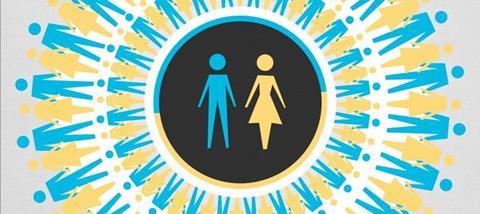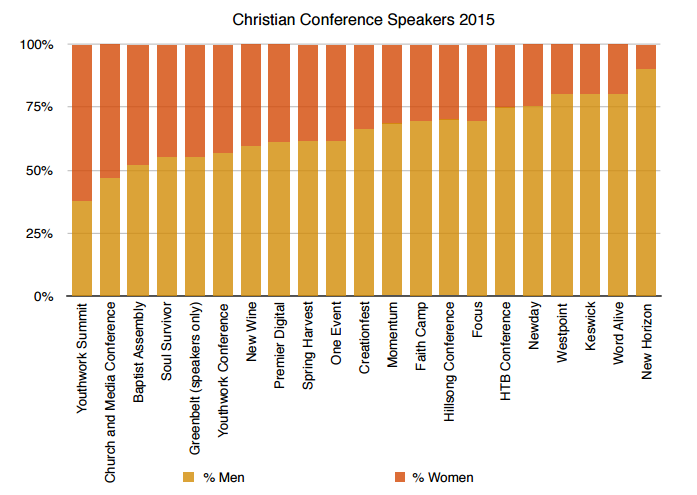
Today, Project 3:28 will release data gathered in 2015 from UK national Christian events.
This is the third year that I have worked to gather statistics on the number of women and men speaking at national events. After our report on gender parity at conferences and festivals in 2013 generated a lot of debate, Project 3:28 was formed to do this annually. Those involved in the project are passionate about seeing gender parity achieved on the national Christian platform, working to engage Christians through statistics and resources to address gender injustice in the church.
Although every event in 2015 had women speakers; both in seminars and on the main stage, some events have complementarian theology. Complementarians believe that women and men have equal value, yet their roles within the church (and family) should be designated by their gender; with men and women complementing each other’s unique and gendered gifts. In practise this means complementarians view the role of preaching and teaching as primarily male rather than female.
Other events hold egalitarian theology, believing that men and women are called according to the gifts God has given them and that their male or femaleness is not a defining feature of the way they live out God’s calling.
Perhaps unsurprisingly, the events with the lowest number of women speaking are those who have complementarian theology. However, few conferences with egalitarian theology had a gender balanced platform. An egalitarian event like the HTB Leadership Conference is only 1 percentage point higher than Newday, a large youth event with explicitly complementarian theology. The Hillsong conference had a similarly unequal gender balance. It is interesting to consider that although a church or organisation may affirm egalitarian theology, their conferences do not seem to reflect that same theology.
It was also interesting to note that the content delivered by women at many events often related to 'women’s issues'; women in leadership, parenting, women’s ministry, the caring professions, relationships and sessions related to 'feelings'. Some complementarian events had a higher percentage of female speakers because women delivered content alongside their husbands.
Although a church or organisation may affirm egalitarian theology, their conferences do not seem to reflect that same theology
Each year as we release the statistics, I expect to hear conversations about whether quotas are a good idea. If events are explicitly egalitarian, should they insist on gender parity on their platform through quotas? The intention behind such questions ranges from well-meaning to 'political correctness gone mad'. Conversations about desiring a meritocracy and not wanting to interfere with 'God’s plan' often ensue.
Quotas are generally a red herring in the conversation about gender parity on platforms. They reduce the very complex reasons why there are less women on the platform down to a lone unachievable solution. These reasons may include a lack of childcare provision for speakers, the belief that mentoring women is the slippery slope to an affair and the thinking by both audiences and event organisers that some subjects are 'default male'.
By producing statistics each year we hope to inspire egalitarian events to see gender parity as a significant consideration in planning events and in the last two years we have been encouraged to see a number of events taking steps to improve the number of women on their platforms.
It can be discouraging and alienating for women to feel as if there is no commitment by events to recognising their gifts and expertise. As events become more intentional about the ways they invite, include and equip women onto the platform, we hope we will continue to see and celebrate more equal numbers of men and women speaking at events.
Natalie Collins is a gender justice specialist and is part of the Project 3:28 collective. She can usually be found ranting on Twitter as @God_loves_women.
For more details about the data, follow @Project328
Click here to request a free copy of Premier Christianity magazine



























